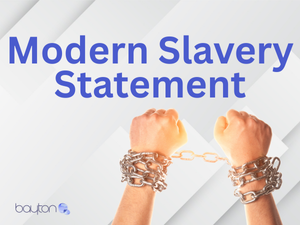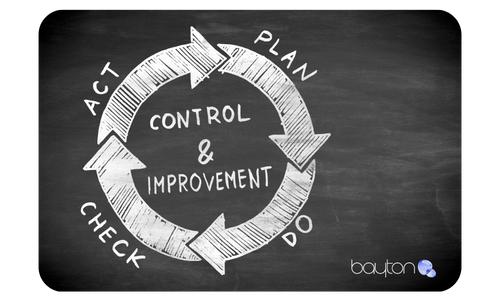High-Risk Geographies
We monitor suppliers in regions where worker protections may be weaker and labour exploitation risks are higher.
Modern Slavery
Zero Tolerance. Total Commitment.
Modern slavery is one of the most serious human rights abuses in the world today, affecting an estimated 50 million people globally.
It exists in every region and in almost every sector, including those connected to cleaning, maintenance, manufacturing, and supply logistics.
At Bayton, we believe there is no grey area: modern slavery in any form, forced labour, servitude, human trafficking, debt bondage, or child labour, has no place in our operations, our supply chain, or the industry we work in.
Our commitment goes well beyond minimum legal requirements. We proactively seek out and address risks, we partner only with those who share our ethical standards, and we work to strengthen systems and cultures that protect the rights and dignity of every worker, everywhere.
.png?width=2300&height=1535&name=modern%20slavery%20lge%20(1).png)
“Protecting people is not optional, it is the foundation of responsible business.”
How We Take Action Every Day

Annual Modern Slavery Statement
Lodged with the Australian Government, outlining actions taken and measurable progress each year.

Supplier Due Diligence
Rigorous ethical vetting before engagement, prioritising integrity, transparency, and human rights safeguards.

Comprehensive Staff Training
Equipping procurement, leadership, and operations teams to identify and address slavery risks.

Strict Contractual Standards
Requiring all suppliers to meet anti-slavery and ethical labour obligations.

Audits & Risk Reviews
Conducting regular supplier assessments with immediate remediation for non-compliance.

Collaborative Supplier Engagement
Partnering to improve ethical practices across every tier of the supply chain.
Supply Chain Transparency & Risk Management
Bayton’s supply chain spans labour services, cleaning products, uniforms, equipment, technology platforms, and subcontracted services. This scale creates both opportunity and responsibility.
We are committed to mapping every tier of our supply chain to identify where risks may occur, with special attention to:
Vulnerable Product Categories
We review low-cost, high-volume goods that can hide unethical labour practices in their production.
Labour-Hire & Subcontracting
We scrutinise third-party labour and subcontracting arrangements to ensure fair and transparent employment conditions.

Aligned to Global Human Rights Standards
Bayton’s anti-slavery strategy is anchored in internationally recognised frameworks and industry best practice:
- Australia’s Modern Slavery Act 2018
- UN Guiding Principles on Business and Human Rights
- International Labour Organisation (ILO) Fundamental Conventions
- UN Sustainable Development Goal 8: Promote decent work and sustainable economic growth for all.
A Continuous, Measurable Journey
We recognise that eradicating modern slavery is not a one-time achievement, it’s an ongoing process requiring constant vigilance, better data, and stronger collaboration across industries and borders.
Our focus is on continuous improvement:
-
Enhancing our detection and reporting systems.
-
Deepening engagement with suppliers and industry peers.
-
Expanding training to empower more people to identify and respond to risks.
-
Using our influence to advocate for systemic change in the cleaning industry and beyond.
By taking an active leadership role, Bayton is working to ensure that every product, service, and partnership reflects our unwavering commitment to human dignity and ethical responsibility.

